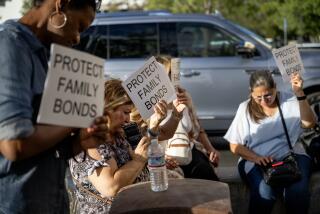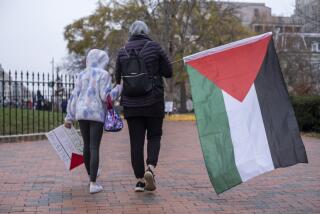A Worldwide Family
- Share via
Growing up, there was no escape from family. My strict Jordanian father believed that the behavior of his children reflected directly on the family. This meant that, although my sisters and I were born in the United States, we weren’t supposed to act like American girls. We wanted to wear short skirts, stay out late, go to parties. But these things were considered taboo in my household. We were supposed to be gleaming models of purity, fortitude and virtue.
My father admired Americans, especially their drive to work hard and succeed. But, like many other Arabs, he also felt that Americans were too loose and wild. My girlfriends had their own rooms with locks on the doors, private phones and TVs. They also had families disrupted by affairs and divorce; they barely knew their grandparents, and some of them had never met their cousins.
I did my share of sneaking out of my bedroom window to attend late-night parties and meet friends. But I was also immersed in family. We gathered for huge dinners. Relatives moved in and out of our house at my father’s invitation. At the time, I envied my friends their freedom: When one of them complained that her father ignored her, I just thought she was lucky not to have her parents hovering over her. I took for granted the connection, identity and family unity that I grew up with.
Now that I’ve spent more time in Jordan, where my father was born, I’ve got a fuller perspective. One thing I’ve figured out is that the great thing about life in the Middle East is that you’re never alone -- and the great problem with life in the Middle East is that you’re never alone.
My father’s Bedouin sensibility was deeply traditional, frequently to the point of rigidity. He worked hard to instill in us his notions of propriety and modesty. At the dinner table, he lectured us on how we must protect the weak, share with others, never gloat and preserve our integrity. Without a sense of justice and honor, he said, people are little more than animals.
I rolled my eyes and dreamed of the day I could go off and be a “normal American.”
But as I grew older, I began to appreciate the “normal Arab” world too. When we returned to the Middle East to visit my father’s relatives, I saw how extended families lived together, parents adding rooms and apartments to their houses to accommodate spouses, children, widowed aunts. There were no homeless, no lonely elderly, no dispossessed. This reality was a powerful echo of my father’s motto, repeated over and over when I was a child: “The family is absolutely sacred.”
Now, I wonder what concepts like shame and honor, evil and sacred mean to us normal Americans, especially when we are faced with seemingly ceaseless images of prisoner torture and brutality at the hands of both Americans and Iraqis.
President Bush reminds me of my father in this sense: Neither really gets “the other.” Bush doesn’t recognize that Arabs may value their ancient, deeply cultivated sense of honor, tradition and family devotion above the American notion of individual freedom and liberty. The American focus on the pursuit of wealth and material goods leaves many Arabs in this country feeling lonely and shortchanged.
It shouldn’t be much of a stretch to imagine Iraqis’ perspective: Their country has been bombed, invaded and occupied by a foreign army that claims to be a liberator even as it attempts to impose its cultural values and beliefs. Arbitrary detentions break apart Iraqi families. Iraqi men are abused and humiliated in jail. Is it any wonder that Iraqis, according to one recent poll sponsored by the U.S. government, overwhelming view the United States as an occupier and want U.S. troops to leave? Iraq’s culture and traditions extend back centuries, yet Bush claims to know better what Iraqis need than the Iraqis themselves.
A friend returning from a year in the Middle East summed up the difference between the cultures this way: “Arabs have family,” he said. “Americans have work.”
My upbringing was full of shalts and shalt-nots. Too many to remember, and many of which I willfully broke. But it gave me a world with known boundaries, and this is something we must create by taking responsibility for our actions in Iraq; we must all be parents in transforming our nation. Each of us must be responsible for creating a nation of compassion and honor.
The human capacity for self-deception is profound, but we are now beyond a question of honor. We face the question of our humanity. The issue is no longer whether we can democratize Iraq or find weapons of mass destruction. These goals are discarded shells of political manipulation. The question now is whether we can save ourselves.
More to Read
Sign up for Essential California
The most important California stories and recommendations in your inbox every morning.
You may occasionally receive promotional content from the Los Angeles Times.













